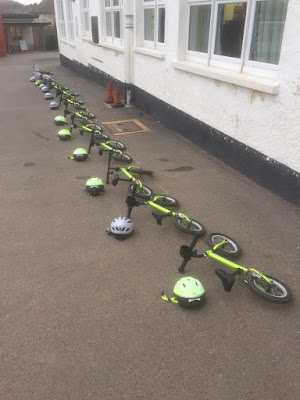Life goes on.
To me now, it all seems such a long time ago. My life has improved beyond all imagination. I am working part-time and have recently become engaged to a wonderful woman. The work I am doing is the best work I have ever undertaken: I teach young children to cycle.
Most of my time is spent teaching these youngsters how to ride correctly on the roads around Devon, whether they are tiny lanes or the streets in towns and cities. It seemed to me to be the best possible way that I could help the widest audience of people to manage their own mental health, by giving them access to something that seems to help people relax and let go of the stresses and strains of life. In short, to be mindful.
Many of these young minds have already been poisoned into believing that riding a bicycle on the road will lead to imminent death, when the fact is that cycling is much more likely to prolong your life than to shorten it. We have to combat that negativity every step o the way, from making sure young people can cross roads safely to much more advanced riding on multi-lane roads, round-abouts and suchlike, in most cases by the end of year seven (11-12 years old). We also need to tackle parental attitudes that don't help, like driving short distances to drop children at schools, clogging p the roads around the area, instead of riding or walking to school and campaigning for better cycle/walking infrastructure along with public transport.
There are just two hours spent off road to teach and revisit Bikeability level 1. After that, it's out on the roads (quiet ones) to learn all about how to use them to your best advantage (and when not to). For many children this is real awakening, something they haven't really considered as possible. To ride a bike on the road is a huge undertaking and not one they have considered.
Unsurprisingly, once they have undertaken a few 'on-road' exercises they start to enjoy it. They ask questions like 'are we going for a ride,' and get all excited as they realise we will be riding to a location away from school to use the local infrastructure or road junctions. By the end of a level 2 course, most are ready to start exploring the roads, some with guidance from parents and carers and others independently.
By year seven, they can undertake a level 3 course, much more advanced riding on busier roads. Some are ready for that, other need to mature further first. And that's where we hit a problem. Secondary schools, with a few notable exceptions like West Exe in Exeter, don't play ball. They feel that time taken away from the classroom is detrimental to the childrens learning. But what about life skills, sustainable living, tackling obesity and getting children to see that time away from screens can be cool too?
These courses are free for the schools that sign up and in my humble opinion, all children should undertake all of the courses from Balancability to Bikeability level 3. Why? Because it potentially unlocks so much freedom, helps to create a healthier population, will increase demand for cycle infrastructure as more people feel they can cycle to school/work and make our streets a more pleasant and varied place once more by removing some of the power from those who drive everywhere.
I'm not suggesting for a minute that everybody should cycle around. Not everybody wants to. But everybody should have a chance to learn, shouldn't they? When I was young it was a right of passage to learn to ride a bike. I still remember the feelings of adventure as I set off as a seven year old with my sister and a bag of jam sandwiches to explore the area we were about to move to. Regardless of what screens and computers have given us, which is a huge amount, being outside, using your physical ability and resting your mind will perhaps have a greater and greater place in our lives as we rely on intellect more and more in our workplaces.
Cycling for health has perhaps never been more important as we face a world that simply can not cope with our demands to buy, consume and throw away goods at will. We have to change and we have to do that now. Cycling, and teaching it, is the small contribution that Bikeability instructors are making. No matter what you believe about cycling, better infrastructure will take more people away from cars, unclogging the roads a little, helping clear city pollution. It will help young people to be healthier and have longevity in their lives and along with that it will help reduce the burden on the NHS at a time when it is creaking under the strains put upon it by our lifestyles.
Cycle for health? Cycle for fun and the health comes free.
See you next time.





No comments:
Post a Comment